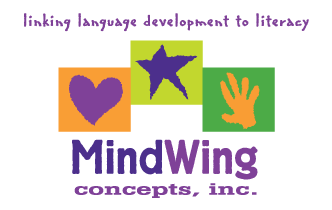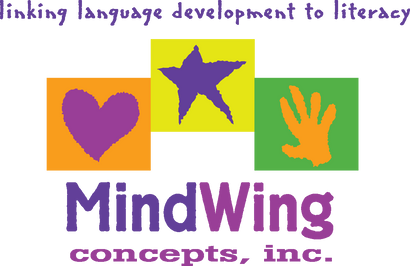Secure Checkout. FREE SHIPPING for Continental U.S. Orders over $60.
Menu
-
- Home
-
About Us
-
The Approach
-
Linking Language & Literacy
-
MindWing Learning
-
Learning Resources
-
SHOP
-
Blog
-
- About MindWing
- Our People
- Contact Us
- Your Account
- Login
-
United States (USD $)

Secure Checkout. FREE SHIPPING for Continental U.S. Orders over $60.
Story-Based Intervention for Children with Autism Spectrum Disorders
by Maryellen Rooney Moreau April 06, 2010 2 min read
Since April is Autism Awareness Month, we thought that the contents of this blog entry should be about MindWing’s tools and methodology as a Story-Based Intervention for children with autism spectrum disorders.
In September, 2009, the National Autism Center announced the results of its multi-year National Standards Project1. This project “serves to support parents and professionals and answers one of the most pressing questions…: How do we effectively treat the growing number of students with autism spectrum disorders (ASD)?” (Wilcynski, S. (2010). Communique. National Association of School Psychologists, 38, 5). In the Findings and Conclusions Report of the National Standards Project and the more comprehensive technical report entitled, National Standards Report, Story-Based Intervention was cited as one of eleven established treatments for autism. The following is Wilcynski’s definition of a Story-Based Intervention Package:
“These interventions include treatments that involve a written description of the situations under which specific behaviors are expected to occur. Stories may be supplemented with additional components (e.g., prompting, reinforcement, discussion, etc.). Social stories™ are the most well-known story-based interventions and they seek to answer the “who, what, when, where, and why” questions in order to improve perspective-taking.”
The National Standards Report stated that Story-Based Intervention influenced self regulation and interpersonal skills. The age group most affected was 6-14 years. The diagnostic classifications most affected by this intervention: Autism Disorders and Asperger’s Syndrome. We at MindWing, through our research and experience over the past 16 years, have found that narrative development is basic to:
- Writing and comprehending social stories™ as well as
- Comprehension and expression of social situations in real life AND
- Comprehension and expression of situations in story books read in school and for pleasure.
- Perspective taking of self and others
- Continuing development of a Theory of Mind, including mental state sentences.
- Cohesive communication of the story as a whole
- Problem-solving and conflict resolution
Children are assisted, through the use of MindWing’s multi-sensory tools and methodology, to comprehend and communicate “the story” at their developmental stage. Story form may be written, oral, pictures, play or drama.
Our new Autism Collection is designed especially for our colleagues working with children with ASD. Please CLICK HERE to see the description in our Store.
Maryellen Rooney Moreau
Maryellen Rooney Moreau, M.Ed., CCC-SLP, is the founder of MindWing Concepts. She earned her Bachelor of Arts degree in Communication Disorders at University of Massachusetts at Amherst as a Commonwealth Honors Scholar, and a Masters of Education in Communication Disorders at Pennsylvania State University. Her forty-year professional career includes school-based SLP, college professor, diagnostician, and Coordinator of Intervention Curriculum and Professional Development for children with language learning disabilities. She designed the Story Grammar Marker® and has been awarded two United States Patents. She has written more than 15 publications and developed more than 60 hands-on tools based on the SGM® methodology. Maryellen was awarded the 2014 Alice H. Garside Lifetime Achievement Award from the International Dyslexia Association, Massachusetts Branch.
Leave a comment.
Comments will be approved before showing up.
